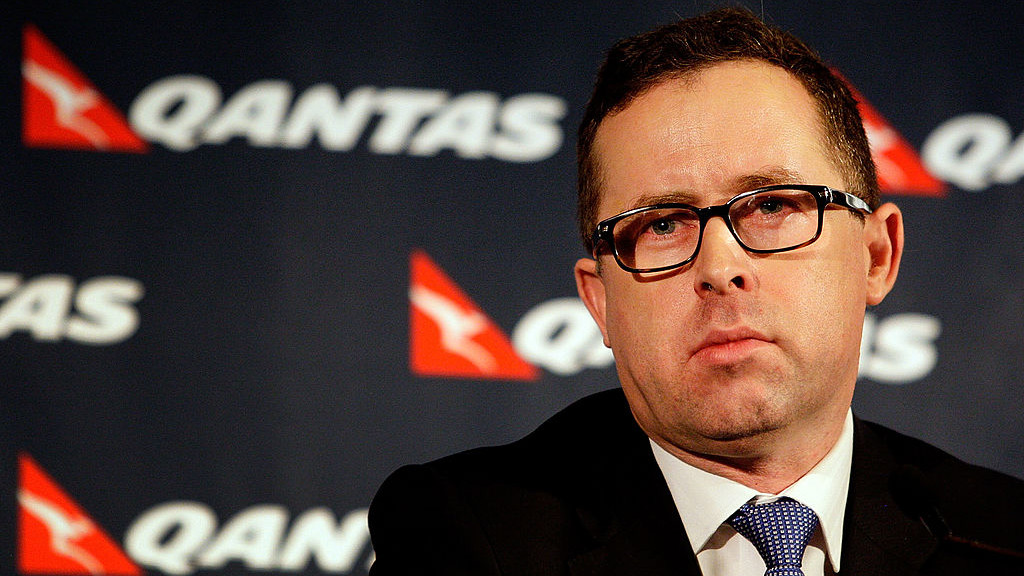Home Alone: Qantas loses $1.9 billion as glum CEO really starts missing the 20,000 staff he fired

Little Joyce for Alan right now. Pic: Lisa Maree Williams / Stringer / Getty Images News.
- Qantas lost $1.9b in FY22, taking the total pandemic hit to $25 billion
- The company is on a hiring spree because execs don’t want to be baggage handling
- Flight Centre loses 46% less than last year, sees a renaissance in the ‘travel advisor’
Aussie airline Qantas (ASX:QAN) just released its FY22 results and CEO Alan Joyce ain’t kidding when he says it’s been a tough year – the group had an underlying loss before tax of almost $2 billion.
“That brings our total losses since the start of the pandemic to more than $7 billion and takes lost revenue to more than $25 billion,” he said. Oof.
“To put that in perspective, on a statutory basis, COVID cost us more money in the past three years than we made in the five years before that.”
“It’s fair to say this has been an extremely challenging time for the Qantas Group, for our people and – unfortunately – for our customers,” Joyce said in a nod to the 20,000 staff stood down at the start of the pandemic and the thousands of customers who’ve been stranded, delayed and lost bags since air travel kicked off again.
Qantas also said revenue jumped 54% compared to 2021 (mostly thanks to the boom in e-commerce for its freight division) and that it’s on track to achieve around $1 billion in savings in the current 2023 financial year.
Massive labour shortage comes back to bite
Joyce is confident the travel industry is rebounding but blames the “massive labour shortage” for recent difficulties.
The company has only hired 1,500 more staff since April, which is probably why they had to ask executives to take a turn as baggage handlers.
“The rebound in travel demand also coincided with a massive labour shortage,” Joyce said.
“Of course, that shortage has been more acute in aviation because of how many people left the industry during two very uncertain years.
“We’re reducing our domestic flying – in part – to give us more buffer. We are rostering more crew across fewer flights, which means we can better cover sick leave that is averaging almost 50 per cent above normal.”
Moving back to profit in FY23
Joyce also said the company is sharing the benefits of recovery now it’s “moving back to profit”.
The Group expects to spend approximately $50 million on pay increases for EBA-covered employees as agreements are finalised in FY23, taking the average non-executive salary at Qantas to more than $100,000.
“We’re setting aside almost $200 million for a non-executive recovery boost of $5,000 and 1,000 Qantas share rights, worth roughly another $5,000,” Joyce said.
Plus, the company also announced they’re expanding staff travel fare discounts for family members, so there could be even more people stuck in airport queues around the country.
Flight Centre loses 46% less than last year
Flight Centre (ASX:FLT) also reported their FY22 results today, flagging a $183.1m underlying EBITDA loss – a 46% improvement on the $337.8million FY21 result.
But they also recorded a $35million underlying profit for the period, and have been operating cash flow positive since March after governments started to remove travel restrictions
“Recovery was driven by rapid sales growth globally after governments relaxed or removed international and domestic travel restrictions, with TTV and revenue increasing 162% to $10.3billion and 154% to $1billion respectively over the full year,” FLT said.
This is mainly due to corporate travel, with the company maintaining high customer retention rates and winning new accounts, with Flight Centre securing accounts with $2.5billion in projected annual spends during FY22, taking total annualised wins during the pandemic to $5.8billion.
Renaissance of the travel advisor
Flight Centre says there’s stronger demand from travelers for human service and advice in a more complex environment.
“This added complexity plays to FLT’s strengths in both the leisure and corporate sectors and is fuelling a “renaissance of the travel advisor”, as travellers seek expert advice,” the company said.
“To better service this demand, the company has continued to target experienced travel agents who were displaced during the pandemic, while also reinitiating its novice recruitment programs at scale (July 2021).
“As a result, FLT is now attracting circa 4500 applicants per month in Australia alone as the travel industry rapidly regains its appeal among jobseekers.”
Early days in recovery though
CEO Graham Skroo Turner says its still early days in the recovery of travel, with Australian outbound passenger departures tracking at just 35% of pre-COVID levels over the FY22 2H, peaking at 60% in June.
“There is also some ongoing supply constraints and macro-economic uncertainty, although these factors do not seem to be slowing the recovery at this stage,” he said.
“While the cost of living is generally increasing, very low unemployment globally and travel’s proven resilience are significant offsetting factors in our business, with customer s having both the means and the desire to make the most of their limited vacation time after being denied that opportunity for some two years.
“Corporates also continue to re-engage face-to-face to re-establish old business relationships or to create new ones.
“While we believe further lockdowns are highly unlikely, there is little visibility around government’s future strategies or intentions,” he added.
Related Topics
UNLOCK INSIGHTS
Discover the untold stories of emerging ASX stocks.
Daily news and expert analysis, it's free to subscribe.
By proceeding, you confirm you understand that we handle personal information in accordance with our Privacy Policy.








